President’s Message

The Malaysian economic growth momentum this year has been resilient thus far and barring unforeseen circumstances , will be sustainable and on track for the GDP growth target of 6% for 2007. This is attributed to strong domestic demand growth, driven mainly by continued expansion in private investment activities in all sectors and continued strong exports.
As we continue to remain vigilant over the anticipate d economic slowdown in the United States and its resultant impact on our economy, we must hasten our efforts to develop strong technical, competitive and innovative capabilities as well as managerial and business skills. These attributes will enable us to offer compelling value propositions in our quest to strike win-win partnerships in the developing countries. Towards
this objective, MASS A is committed to highlight to members our Government’s facilitative efforts in creating a conducive business environment to enable our business private sector to develop their potential to be a prime driver of economic growth. On the other hand, MASSA will continue to bring to members’ attention the emerging business opportunities in the developing countries.
We are grateful for the excellent support of MITI and its agencies, particularly MIDA, MATRADE and SMIDEC for the close co-operation to complement each other to assist our members to expand their trade and investment boundaries.
Data and statistics have shown that Malaysian investments abroad have been projected to remain significant , reflecting the sustained interest of Malaysian companies to expand and diversify their operations abroad. This augurs well as we strive to expand and widen the range of quality Malaysian products, services, brands and franchises in the developing countries. I take this occasion to wish all our Muslim members and readers “Selamat Hari Raya Aidilfitri” on this coming festive occasion and also “Happy Deepavali”.

TAN SRI DATO’ AZMAN HASHIM
President
Forthcoming Events
Showcase Malaysia, 20 – 22 March 2008 in Bangladesh
From 20 to 22 March 2008, the Bangladesh-Malaysia Chamber of Commerce & Industry (BMCCI) will be organising a Malaysia Single Country Trade Event known as ‘Showcase Malaysia 2008’ at Winter Garden, Dhaka Sheraton Hotel, Dhaka, Bangladesh.
Bangladesh, with an estimated population of 150 million (as at July 2007), is a potentially vast market for Malaysian exporters of goods and services. Many Malaysian companies have already successfully penetrated Bangladesh, especially in products such as bicycles, herbal products, bakeries as well as investment in the telecommunication sector.
MASSA members are cordially invited to participate in this event to take advantage of the market potential of Bangladesh. Please note that deadline for registration is 10 March 2008.
For further information, please do not hesitate to contact:

Diary Of Events
INTRADE Malaysia 2007, 12 – 15 November 2007
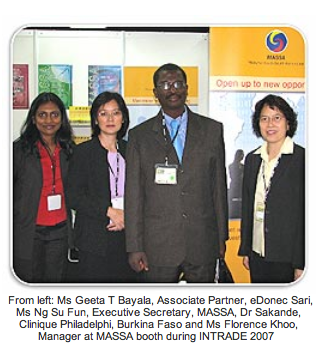 MASSA participated in the International Trade Malaysia 2007 Exhibition (INTRADE Malaysia 2007) organised by MATRADE at the MATRADE Exhibition and Convention Centre (MECC), Menara MATRADE, Kuala Lumpur. With its theme, “Fostering Business Collaborations”, this international exhibition attracted 366 companies from 49 countries covering 37 industries ranging from agro-based and bio-tech products, automotive, education, electrical and electronics, food and beverages, giftware, jewellery, textile, palm oil and oleo products.
MASSA participated in the International Trade Malaysia 2007 Exhibition (INTRADE Malaysia 2007) organised by MATRADE at the MATRADE Exhibition and Convention Centre (MECC), Menara MATRADE, Kuala Lumpur. With its theme, “Fostering Business Collaborations”, this international exhibition attracted 366 companies from 49 countries covering 37 industries ranging from agro-based and bio-tech products, automotive, education, electrical and electronics, food and beverages, giftware, jewellery, textile, palm oil and oleo products.
On 13 and 14 November, MATRADE hosted the Incoming Buying Mission (IBM) programme which was attended by more than 900 international buyers from around the world. One-to-one meetings between Malaysian and foreign businessmen were also held during this time.
In conjunction with this international trade exhibition, MATRADE also organised the Kuala Lumpur International Trade Forum (KLITF) on 12 November 2007 which was attended by 800 participants.
This exhibition provided an opportunity for the Malaysian business community to further develop business linkages for trade, investments and bilateral cooperation with the international business community.
Cross Border Investment Seminar on Nigeria, 15 November 2007
 In conjunction with the visit of high level officials from the Federal Republic in Nigeria to Malaysia, the Nigeria High Commission of the Federal Republic of Nigeria co-organised the Seminar on “Business and Investment Opportunities in Nigeria” with MIDA and MASSA at MATRADE Hall, Kuala Lumpur for MASSA members.
In conjunction with the visit of high level officials from the Federal Republic in Nigeria to Malaysia, the Nigeria High Commission of the Federal Republic of Nigeria co-organised the Seminar on “Business and Investment Opportunities in Nigeria” with MIDA and MASSA at MATRADE Hall, Kuala Lumpur for MASSA members.
Mr Ibrahim Hamidu, Trade Counsellor from the Nigeria High Commission in Malaysia delivered the Welcome Remarks with Address by Engr. Mustafa Bello, Executive Secretary/CEO, Nigerian Investment Promotion Commission (NIPC).
The Honourable Senator Sanusi Daggash, Minister/Chairman National Planning Commission, Nigeria delivered the Keynote Address. The panel of speakers at this seminar were The Honourable Ademola Seriki, Minister of State for Agriculture, Nigeria, The Honourable Alh. Ahmed Mohammed Gusau, Minister of State, Ministry of Mines and Steel Development, Nigeria, Engr. Mustafa Bello, FNSE Executive Secretary/CEO, Nigerian Investment Promotion Commission (NIPC), Nigeria, Mr Reginald Ihejiahi, Managing Director, Fidelity Bank Plc, Nigeria and Mr Sina A. Agboluaja, Managing Director/CEO, Nigerian Export Processing Zones Authority, Nigeria. One-to-one business meetings were held between Malaysian and Nigerian businessmen at the end of the seminar. 105 participants from 74 Malaysian companies attended this seminar.

Talk by Mr Jean-Francois Couve, Managing Director of L’Oréal Malaysia, 14 November 2007
 Continuing with MASSA’s collaboration with the French Foreign Trade Advisors of Malaysia or Conseillers du Commerce Exterieur de la France (CCEs), Mr Jean-Francois Couve, Managing Director of L’Oréal Malaysia gave a very interesting presentation to MASSA members and guests on 14 November 2007. It was held at the premises of L’Oréal Malaysia in Petaling Jaya.
Continuing with MASSA’s collaboration with the French Foreign Trade Advisors of Malaysia or Conseillers du Commerce Exterieur de la France (CCEs), Mr Jean-Francois Couve, Managing Director of L’Oréal Malaysia gave a very interesting presentation to MASSA members and guests on 14 November 2007. It was held at the premises of L’Oréal Malaysia in Petaling Jaya.
The presentation highlighted:
L’Oréal is the global leader in cosmetics, with 19 global brands focusing on five key areas of expertise: hair care, hair colour, skin care, make-up and fragrances. These global brands include L’Oréal Professional, Kerastase, Redken, Matrix, L’Oréal Paris, Garnier, Maybelline, Softsheen, Carson, Lancôme, Biotherm, Helena Rubinstein, Giorgio Armani, Ralph Lauren, Cacharel, Kiehl’s, Shu Uemura, Vichy, La Roche-Posay and The Body Shop.
L’Oréal has 14 research centres and 13 evaluation centres across the globe reflecting its commitment to research development and innovations, marketing and branding strategies in different countries reflecting different preferences due to diverse ethnicities, as well as brand positioning.
Truly a Global Company!
Visit by Mr Alain Boehm, Expert, Head of South East Asia, ECTI, France, 19 November 2007
 Mr Alain Boehm, Expert, Head of South East Asia, ECTI, France visited MASSA. ECTI is an independent, non-profit making, state approved association which was created in 1974 for French senior volunteers to provide their expertise and services to SMEs, Government departments, international organisations, etc.
Mr Alain Boehm, Expert, Head of South East Asia, ECTI, France visited MASSA. ECTI is an independent, non-profit making, state approved association which was created in 1974 for French senior volunteers to provide their expertise and services to SMEs, Government departments, international organisations, etc.
Lunch meeting hosted by H.E. Mr Mpumelelo J.N. Hlope, High Commissioner of the Kingdom of Swaziland to Malaysia, 22 November 2007

Lunch meeting hosted by H.E. Mr Mpumelelo J.N. Hlope, High Commissioner of the Kingdom of Swaziland to Malaysia at the Bankers Club, Kuala Lumpur.
Networking Evening with Malaysia Australia Business Council (MABC), 29 November 2007
A Networking Evening for MASSA members was organised by MASSA and the Malaysia Australia Business Council (MABC) at the Australian High Commission, Jalan Yap Kwan Seng, Kuala Lumpur.
Visit of Mauritanian Visitors to Malaysia, 1 – 5 December 2007
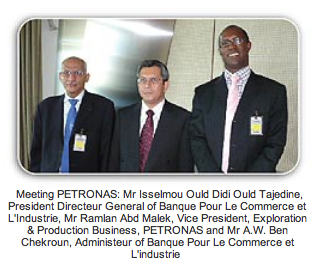 Mr Isselmou Ould Tajedine, President of the Bank for Business and Industry (BCI) of Mauritania and Mr Ben Chekroun, General Manager of Sinergie visited Malaysia from 1 – 5 December 2007. The purpose of their visit was to explore business opportunities and to develop partnerships with Malaysian firms in the various sectors, i.e. oil & gas, banking, insurance, infrastructure development, agro processing, etc.
Mr Isselmou Ould Tajedine, President of the Bank for Business and Industry (BCI) of Mauritania and Mr Ben Chekroun, General Manager of Sinergie visited Malaysia from 1 – 5 December 2007. The purpose of their visit was to explore business opportunities and to develop partnerships with Malaysian firms in the various sectors, i.e. oil & gas, banking, insurance, infrastructure development, agro processing, etc.
MASSA facilitated this visit by organising meetings with Petroliam Nasional Berhad (PETRONAS), AmIslamic Bank, Bina Puri Holdings Berhad, Ranhill Berhad and Alami Vegetable Oil Products Sdn Bhd.

Cross Border Investment (CBI) – Seminar on Bosnia and Herzegovina
Cross Border Investment Seminar on Bosnia and Herzegovina,
14 November 2007
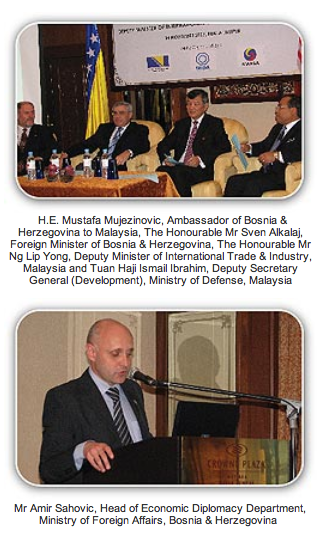 A seminar on “Business Opportunities in Bosnia and Herzegovina” organised by MIDA, MASSA and in collaboration with the Embassy of Bosnia & Herzegovina was held at the Crowne Plaza Mutiara, Kuala Lumpur for MASSA members. 15 companies from Bosnia and Herzegovina participated at this seminar.
A seminar on “Business Opportunities in Bosnia and Herzegovina” organised by MIDA, MASSA and in collaboration with the Embassy of Bosnia & Herzegovina was held at the Crowne Plaza Mutiara, Kuala Lumpur for MASSA members. 15 companies from Bosnia and Herzegovina participated at this seminar.
H.E. Mr Mustafa Mujezinovic, Ambassador of the Bosnia and Herzegovina to Malaysia delivered the Opening Address at the seminar.
The Honourable Mr Sven Alkalaj, Foreign Minister of Bosnia & Herzegovina delivered the Welcome Remarks and YB Mr Ng Lip Yong, Deputy Minister of International Trade and Industry, Malaysia delivered the Keynote Address at this seminar.
Speakers from Bosnia & Herzegovina at this seminar were Mrs Slavika Korica, Foreign Investment Promotion Agency (FIPA), Mr Milan Lovric, President, Foreign Trade Chamber of Commerce & Industry and Mr Amir Sahovic, Head of Economic Diplomacy Department, Ministry for Foreign Affairs.
One-to-one business meetings between Bosnian delegates and Malaysian businessmen were held at the end of this seminar. A total of 61 Malaysian companies attended this seminar.
The Honourable Mr Sven Alkalaj, Foreign Minister of Bosnia & Herzegovina later hosted a dinner for all the participants present at this event.
South-South Country Focus – Uruguay
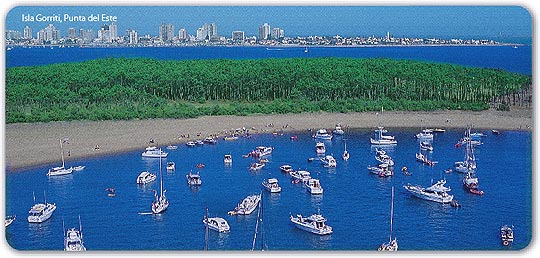
About a month ago the Uruguayan President, Dr Tabaré Vazquez visited Malaysia leading an important governmental and private sector delegation. The visit was a momentous one. It allowed Malaysia’s business people to have a direct look into the potential to develop the trade and investment links between the two countries and to build up the synergies that exist and can lead to generate more strategic partnerships based on their comparative advantages and strengths. MASSA played an important role during the visit.
Trade and Investment between Malaysia and Uruguay is still relatively modest, but steadily increasing at interesting rates (over 44% in 2007). Trade amounts to about RM70 million both ways. It is also quite balanced. Uruguay exports to Malaysia beef, fish, leather, dairy products and imports electric and electronic goods and industrial machinery.
If you look at these figures and at the sheer size of the country you might wonder: Why Uruguay?
Because Of Its Location And Market Access
In most countries’ promotion strategies, there is a mention to the fact that they are a gateway to larger regions. In the case of Uruguay, I do believe that this is particularly accurate. Uruguay is geographically at the centre of a market inhabited by more than 260 million consumers, with the highest per capita income in the continent, and a combined GDP of USD1.3 trillion.
MERCOSUR has its best “gateway” in Uruguay, greatly enhanced by the conditions that the MERCOSUR agreement has created for the development of trade and business among the members of the block. Uruguay also has a bilateral free trade agreement with Mexico that gives tariff free access to 90% of all products and also includes services and investments. Easy access to that large market (especially to the core of business in the region, situated in a 1.500 km radius area, and to other regions and countries in the world is assured by an extensive and varied communications network, together with strongly competitive financial and business support services. Uruguay qualifies as an ideal platform from where business opportunities are launched to the region and the world.
This is particularly true when it comes to logistics. Uruguay has about 1.5% of MERCOSUR’s GDP, but through its ports it mobilises over 6% of the containers traffic. It is interesting to note that Central Warehousing Corporation of India has recently acquired space at the containers terminal of the Port of Montevideo in order to serve as a logistics centre for Indian exporters to the MERCOSUR region.
Because Of The Quality Of Its Institutions
Uruguay is a stable, democratic country with a long tradition of upholding the rule of law, providing a safe and secure environment for business and a great quality of life. Uruguay rates high in all international indexes relating to human and institutional development: It rates 46 in the world in the UNDP Human Development Index, 33 in the Economic Freedom Index, 27 in the Democracy Index published by “The Economist” and 28 in the Transparency International Index. As President Vazquez said in his MASSA intervention: “… I invite you to Uruguay, a serious and reliable country, a country with firm democratic values, a place where you can walk the streets without bodyguards, a country where you don’t have to appeal to spurious methods to do good business. A country that is not perfect, but that has many good things and that wants to keep progressing to construct a better world and to improve the quality of living of its people…”
Because Of Its Regulatory Framework
Uruguay makes no discrimination between local and foreign investments. No previous registration or authorisation required. No restrictions on capital or profit repatriation. Remittance can be made in any currency at any time. No limits on foreign capital share in companies. There is a liberal tax exemptions regime for investment projects. In addition, investments can be located in Free Trade Zones exempted from capital and income tax, as well as from any other tax created (as from 1987) or to be created in the future.
Montevideo is the first and only free port of the Atlantic Coast of South America. Free merchandise transit, no authorisations or formal procedures required. Within port facilities, goods are exempted from all import levies. Recent reforms to the tax regime included among other measures a reduction of corporate income tax: from 30% to 25%; incentives to reinvest: up to 40% of the net fiscal rent; lengthening of the prescription terms of fiscal losses: from 3 to 5 tax years; fiscal exemptions of rents related to R&D, biotechnology and software for export.
The regulatory framework includes newly adopted legislation in Competition Law, Credit Guarantee Fund, Protection Of Property Rights and Bankruptcy Law.
Because It Is An Economy In Expansion
After the deep financial crisis of the River Plate (comparable to the Southeast Asia crisis of 1998), the country retook a growth path at “Asian” rates: 2.5% in 2003, 12.3% in 2004; 6.6% in 2005; 7.0% in 2006 and 7.25% in 2007. According to conservative expectations, growth for 2008 is forecasted at a minimum of 5%. All sectors of the economy are performing well, with all components of the demand growing. Investments as a percentage of GDP are recovering visibly, reaching 16%. FDI attained USD1.6 billion in 2007. Both imports and exports are experiencing double digit growth consistently over the last five years, reaching record heights.
Because Of Its Human Capital
Education and good social indicators have traditionally been Uruguay’s strong competitive advantages. This is exemplified by the information technology sector’s consistent growth.
These businesses have a sound professional base to undertake their activities. Within this sector, there is a highly qualified group of engineers, system analysts and programmers with technical abilities in integration with systems and in software product development. In addition to their skills, the professionals involved in this sector also have a good command of English as a second language. These skilled human resources are available at competitive salaries, i.e. 25% lower than in Argentina and 65% lower than in the USA. This has attracted a growing number of foreign companies such as: Tata Consultancy Services, Trinitech, Microsoft, IBM, Oracle, Bull, Unisys and Soluziona.
Where Do We See Potential For Malaysian Firms?
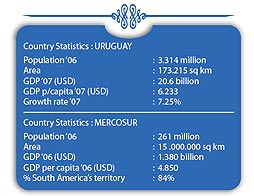
Manufacturing in the area of agribusiness, particularly foodstuff, plywood and the furniture industry (the country possesses about 1 million hectares of forestry plantations apt for both pulp and saw-mills), tourism (Uruguay received about 2.2 million tourists in 2006), logistics, construction, infrastructure, software development and electronics among others.
Interestingly, a Malaysian company has already foreseen the potential offered by Uruguay and decided to go there and break new ground. ADVENTA, a manufacturer of latex gloves for medical purposes, installed a state-of-the-art factory near Montevideo, employing over 200 people with the aim to supply the regional market from Uruguay. During the pres
ident’s visit, a number of firms were keenly interested in the possibilities offered by Uruguay, particularly in the electronic and
 timber sectors.
timber sectors.

- State Visit of H.E. Dr Tabare Vazquez, President of the Oriental Republic of Uruguay to Malaysia and Vietnam, 15 – 20 November 2007
- Power Lunch at Lemon Garden Terrace, Shangri-la Hotel, K. Lumpur, 16 November 2007
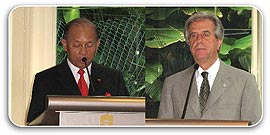
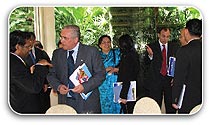
State Visit of H.E. Dr Tabare Vazquez, President of the Oriental Republic of Uruguay to Malaysia and Vietnam. The President of Uruguay was accompanied by Mr Danilo Astori, Minister of Economy and Finances, Mr Enrique Rubio, Minister of Planning & Budget, Mr Herman Vergara, Governor of Lavalleja, Mr Artigas Barrios, Governor of Rocha and 21 delegation members from the government and private sector.
In conjunction with this visit, NCCIM and the Embassy of the Oriental Republic of Uruguay in Malaysia organised the Malaysia-Uruguay Business Forum at the Sarawak Room, Shangri-la Hotel, Kuala Lumpur on 16 November 2007.
On the same day, the Embassy of the Oriental Republic of Uruguay in Malaysia with the support of MASSA organised a Power Lunch for the President of Uruguay and delegation members with Malaysian business community at the Lemon Garden Terrace, Shangri-la Hotel, Kuala Lumpur.
YBhg Tan Sri Dato’ Azman Hashim, President of MASSA addressed the invitees present at this Power Lunch which also included YB Mr Ng Lip Yong, Deputy Ministry of International Trade and Industry, Malaysia, Minister in Attendance, Hon. Datuk Dr Maximus Johnity Ongkili, Minister in the Prime Minister’s Department and H.E. Pablo Sader, Ambassador of Uruguay to Malaysia. 40 guests were present at this event.
Malaysian Companies In South Africa
 INS TRADING
INS TRADING
INS Trading is a subsidiary company for INS Bioscience Sdn Bhd in Malaysia. They are the pioneer in Research & Development of Biotechnology. After years of Research & Development in Biotechnology and Nano technology, INS has successfully developed many advanced and high quality products with natural and organic ingredients. These products include:
• Natural health care products
• Functional food
• Slimming and nutrition replacement meal
All the products have been awarded and recognised internationally and approved by the Department of Health in Malaysia. INS’s vision is growing from strength to strength and to continue to advance as a global player, we remain dedicated to improving the quality of life of people around the world by delivering better and safer products.
Their products include:
• INS Wheatgrass range
• So easy slim care nutri-scheme (slimming product)
• Bio trim 1 and 2 • High calcium
• High fibre • Procan
• Skywheat for cholesterol • Bio drinks
• 1E20 – For men’s vitality
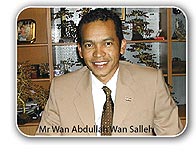 WGS AFRICA (Wan’s Gem Stones)
WGS AFRICA (Wan’s Gem Stones)
Wan’s Gem Stones started in 1996 as a wholesale company with only one staff member. Now it is a friendly, family-run business with a small team of specialist craftspeople who specialise in producing unique creations using the finest gem stones and associated materials.
Based in Sandton, Johannesburg, they specialise in manufacturing semi-precious gemstone trees. Stones are extracted from mother earth in Africa and all around the world. The stones are of the highest quality, and the workmanship is meticulous. There is a wide variety of design, styles, colours and products that can also be customised to suit your needs. The workshop is on the premises and the craftspeople work behind the scenes to create wonderful pieces of jewellery, necklaces, bracelets, earrings as well as a range of ornaments, bonsai trees, bushes, etc.
WGS Africa’s mission is to provide excellent service, good quality products, individually custom-made and genuine hand-made products from Africa. Additionally, they also source for the most beautiful stones in Africa of every variety and turn them into unique pieces of art for the customers to enjoy wherever they are in the world.

GARUDA ENTERPRISES (Eddies Fashion Clothing)
 Garuda Enterprises specialises in retail, wholesale and business consulting. The company has been operational for nearly 2 years now and has grown by leaps and bounds and intends expanding its operations to Southern Africa. The ultimate aim for Mr Wan Omar Khan Bin Wan Othman, who is the owner, is to develop and administer foreign business concerns especially from Malaysia and to encourage more Malaysian businesses to expand their operations to Africa.
Garuda Enterprises specialises in retail, wholesale and business consulting. The company has been operational for nearly 2 years now and has grown by leaps and bounds and intends expanding its operations to Southern Africa. The ultimate aim for Mr Wan Omar Khan Bin Wan Othman, who is the owner, is to develop and administer foreign business concerns especially from Malaysia and to encourage more Malaysian businesses to expand their operations to Africa.
BLUE VALLEY
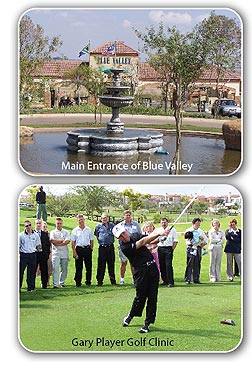 Mitrajaya Development SA (Pty) Ltd, is a wholly owned subsidiary of Malaysian Public Listed Company, Mitrajaya Holdings Berhad. Blue Valley is a perfect blend of hospitality, sport and nature. It is situated conveniently between northern Johannesburg and Pretoria. This residential golf estate offers a location second to none in the Gauteng area. The Gary Player Designed Golf Course at Blue Valley Golf & Country Estate has been designed to make full use of the natural features of the site, while at the same time providing a memorable and challenging golfing experience. Hazards in the form of bunkers and water features provide strategic and aesthetic value. The bunkers have steep grass faces and represent a more traditional style. The greens generally feature soft undulations, to provide a fair and interesting challenge. The landscaping theme of the golf course is indigenous, with typical Highveld trees species being used.
Mitrajaya Development SA (Pty) Ltd, is a wholly owned subsidiary of Malaysian Public Listed Company, Mitrajaya Holdings Berhad. Blue Valley is a perfect blend of hospitality, sport and nature. It is situated conveniently between northern Johannesburg and Pretoria. This residential golf estate offers a location second to none in the Gauteng area. The Gary Player Designed Golf Course at Blue Valley Golf & Country Estate has been designed to make full use of the natural features of the site, while at the same time providing a memorable and challenging golfing experience. Hazards in the form of bunkers and water features provide strategic and aesthetic value. The bunkers have steep grass faces and represent a more traditional style. The greens generally feature soft undulations, to provide a fair and interesting challenge. The landscaping theme of the golf course is indigenous, with typical Highveld trees species being used.
Facilities that are available at the residential and business Gary Player signature Golf Estate are:
• Gary Player Designed Golf Course
• 4000sq meter Tuscan Design Clubhouse
• Muss Gammon Golf Academy
• Full conference & banquet facilities for 200 people
• 3 breakaway meeting rooms
• Formal/informal bar lounges
• Beauty & Health Spa with steam rooms
• Tennis courts
• Squash courts
• Pro shop

Feature on MATRADE: Trade Commissioner In South Africa
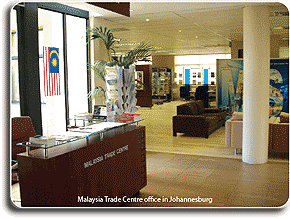 The Country That Offers Opportunities
The Country That Offers Opportunities
South Africa is the economic powerhouse of Africa, with a gross domestic product (GDP) four times that of its Southern African neighbours and comprising around 25% of the entire continent’s GDP. The country leads the continent in industrial output (40% of total output) and mineral production (45%) and generates most of Africa’s electricity (over 50%).
Its major strengths include its physical and economic infrastructure, natural mineral and metal resources, a growing manufacturing sector, and strong growth potential in the tourism, higher value-added manufacturing and service industries.
South African banking regulations rank with the best in the world. The sector has long been rated among the top 10 globally. There are 55 locally controlled banks, 12 foreign-controlled banks and five mutual banks. Some of the world’s leading institutions such as Barclays and Industrial & Commercial Bank of China (ICBC) have entered the local banking sector through mergers and acquisitions.
The JSE Limited is the 18th largest exchange in the world by market capitalisation. The JSE’s rules and their enforcement are based on global best practices, while the JSE’s automated trading, settlement, transfer and registration systems are the equal of any in the world.
Four main metropolitan areas dominate economic activity within the country: Johannesburg and its surrounds (Gauteng province), the coastal Durban/Pinetown areas (KwaZulu-Natal), the Cape Peninsula (which includes Cape Town), and the Eastern Cape’s Port Elizabeth/Uitenhage area. The financial and industrial sectors are concentrated in Gauteng province, which on its own account for over 30% of the country’s GDP.
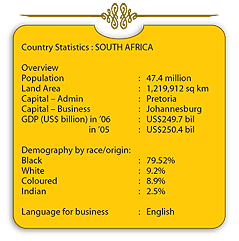 The government’s aim of pursuing economic growth is more than just the growth itself. It provides people with work opportunities, higher incomes to buy or build homes, acquire furniture, contribute towards their children’s education, consume water and electricity and generally improve their quality of life. The economy is undergoing its longest expansion on record, and in recent years has experienced elevated growth in an environment of rapid credit expansion, booming asset prices, strengthening public finances, and rising international reserves financed by large capital inflows.
The government’s aim of pursuing economic growth is more than just the growth itself. It provides people with work opportunities, higher incomes to buy or build homes, acquire furniture, contribute towards their children’s education, consume water and electricity and generally improve their quality of life. The economy is undergoing its longest expansion on record, and in recent years has experienced elevated growth in an environment of rapid credit expansion, booming asset prices, strengthening public finances, and rising international reserves financed by large capital inflows.
South Africa’s economy has been in an upward phase of the business cycle since September 1999 – the longest period of economic expansion in the country’s recorded history. During this upswing – from September 1999, the annual economic growth rate averaged 3.5%. In the decade leading to 1994, economic growth averaged less than 1% a year. Following the 5% real GDP growth experienced in 2006, the International Monetary Fund projected growth for 2007 is 4.8% followed by 4.5% real GDP growth in 2008.
 How Malaysian Companies Can Benefit From South Africa
How Malaysian Companies Can Benefit From South Africa
South Africa has a very young population with more than 30% of the population under the age of 14 years. 10% comprises teenagers, 18% aged between 20 and 30, whilst only 5% of the population is older than 65. Suppliers of products and services targeting the young economically active populations are likely to benefit from this. This would include not only basic goods, such as food and clothes, but also luxuries like television sets, radios, cellular telephones and motor vehicles.
However, the largest proportion of the South African population is still the economically disadvantaged black population with very high birth rates. This portion of the market, about 65% of the total population of 0 – 10 year olds, will have limited resources for manufactured and expensive baby goods. They consume only basic foodstuffs, and have one or two sets of clothes and homemade toys. However, contrary to their basic lifestyles, parents ensure good medical treatment for their children due to free medical treatment in state hospitals.
Malaysian companies need to be aware of the following:
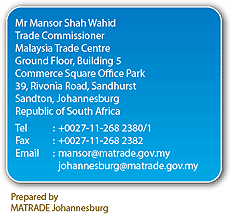 Government procurement under Black Economic Empowerment (BEE) – Malaysian companies who are interested to participate in Government Procurement tenders must comply with the BEE requirements which give preference to local companies and local products. The solution is to participate through joint venture with local partners. Malaysian companies need to identify the right and eligible partners as well as the correct processes for joint venture agreements.
Government procurement under Black Economic Empowerment (BEE) – Malaysian companies who are interested to participate in Government Procurement tenders must comply with the BEE requirements which give preference to local companies and local products. The solution is to participate through joint venture with local partners. Malaysian companies need to identify the right and eligible partners as well as the correct processes for joint venture agreements.
South Africa has the finest infrastructure on the African continent: a well-maintained and ever increasing road and rail system with links to the entire subcontinent and the busiest airport in Africa, and one of the busiest in the southern hemisphere. The country is marching forward as an African and world leader into the millennium, armed with excellence.
Bank Negara Malaysia – The Government’s Commitment in Assisting SMEs

Apart from banking institutions, which still remain the largest financing provider to SMEs, SMEs could also obtain financial assistance from Government Funds including Bank Negara Malaysia Special Funds. These funds are made available to SMEs as part of the Government’s continuous effort to nurture and support deserving SMEs to have access to financing.
Bank Negara Malaysia SME Special Funds
Bank Negara Malaysia provides five special funds for SMEs with a total allocation of RM11.4 billion, aimed at enhancing access to financing at reasonable costs, with lending rates ranging from 3.75% to 6%. The funds are channeled through participating financial institutions comprising banking institutions, development financial institutions and ERF Sdn Bhd. These funds are:


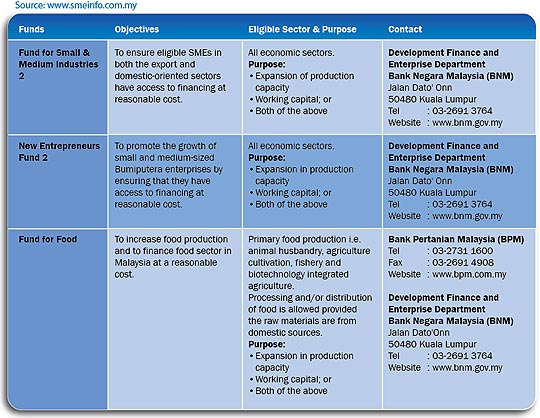
Since the establishment of the funds, RM15.6 billion of loans has been approved to more than 32,600 SMEs.
Government Funding for SMEs
The Government via its Ministries and Agencies also provide financing for SMEs. The objectives of the funds and schemes are to:
• encourage SMEs to be more innovative in using and adapting to existing and new technologies and processes
• improve product quality
• assist SMEs in conducting market and technology feasibility studies, preparing business plans and formulating
domestic and export market strategies
• assist youth, including graduates, to venture into business
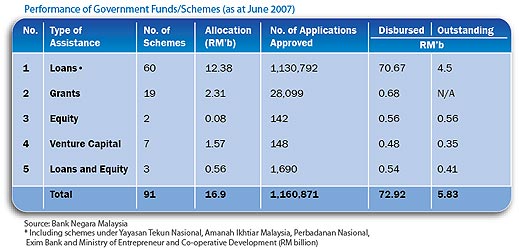
For more details on Bank Negara Malaysia Special Funds and Government Funding,
Editorial
November was an extremely busy month for MASSA. Thanks to INTRADE Malaysia 2007, which was a resounding success, MASSA was privileged to host a number of incoming business delegations. These include visitors from Nigeria, Burkina Faso, Mauritania and Bosnia & Herzegovina to name a few. We sincerely hope that member’s meetings with these delegations have been fruitful.
MASSA was also privileged to co-organise a luncheon for the President of Uruguay. Uruguay is a small but surely emerging economy in South America that can be Malaysia’s launch pad into South America. We thank H.E. Pablo Sader for contributing an informative article on his beloved country in this edition. We have also featured our Malaysians doing business in the Republic of South Africa.
MASSA’s ongoing collaboration with the Bangladesh-Malaysia Chamber of Commerce and Industry (BMCCI) is staging “Showcase Malaysia 2008” in Dhaka, Bangladesh in March 2008. This inaugural event is held to bring together a wide range of Malaysian products and services for the Bangladeshi market. A population of 140 million people with increasing purchasing power is a market that has enormous potential and growth opportunity for our products and services. We look forward to your participation in this event.
Overall, this year has been a busy and productive one and we owe it to our members and their participation.
We would like to record our appreciation to the sponsors who have made the four publications of our newsletter for 2007 possible.
As we herald in the New Year, we in the Editorial Team wish all members and readers Season’s Greetings and a Happy & Productive New Year!
Hamidah Tun Ghafar
Editor
President’s Message

2007 was a year whose economic growth was driven by strong domestic demand. Given the global uncertainties due to the high oil prices, political tensions in West Asia, sub-prime mortgage dilemma in the United States and global inflationary pressures underpinning the global financial system, Malaysia is expected to achieve a GDP growth rate of 5% – 6% for 2007.
Going forward, 2008 will be a challenging year as we continue to manage the abovementioned risk factors. In this respect, globalisation calls for smart and strategic partnerships to sharpen our competitiveness and business success.
Asia will continue to remain robust, and Malaysia will be bouyed by the optimism underpinning the region. The robust growth of developing economies of China, India and Vietnam will bode well for our Malaysian companies to expand in manufacturing, services or construction related activities in these emerging economies.
MASSA will continue to highlight the emerging opportunities for business linkages in these countries and other regions for the benefit of members.
I would like to thank all our contributors for various interesting articles that have been featured in the four issues of 2007. These include the various Government Ministries and agencies, Bank Negara and also the various Embassies and High Commissions for their country features.
MASSA is grateful for the continuing Government support especially from MITI, MIDA, MATRADE and the Ministry of Foreign Affairs and our Malaysian diplomatic missions in the developing countries.
To all MASSA members and the Executive Committee Members of MASSA, I thank you for your valuable participation and contribution to the Association and wish you and your families Seasons’ Greetings and a Successful 2008.

TAN SRI DATO’ AZMAN HASHIM
President
